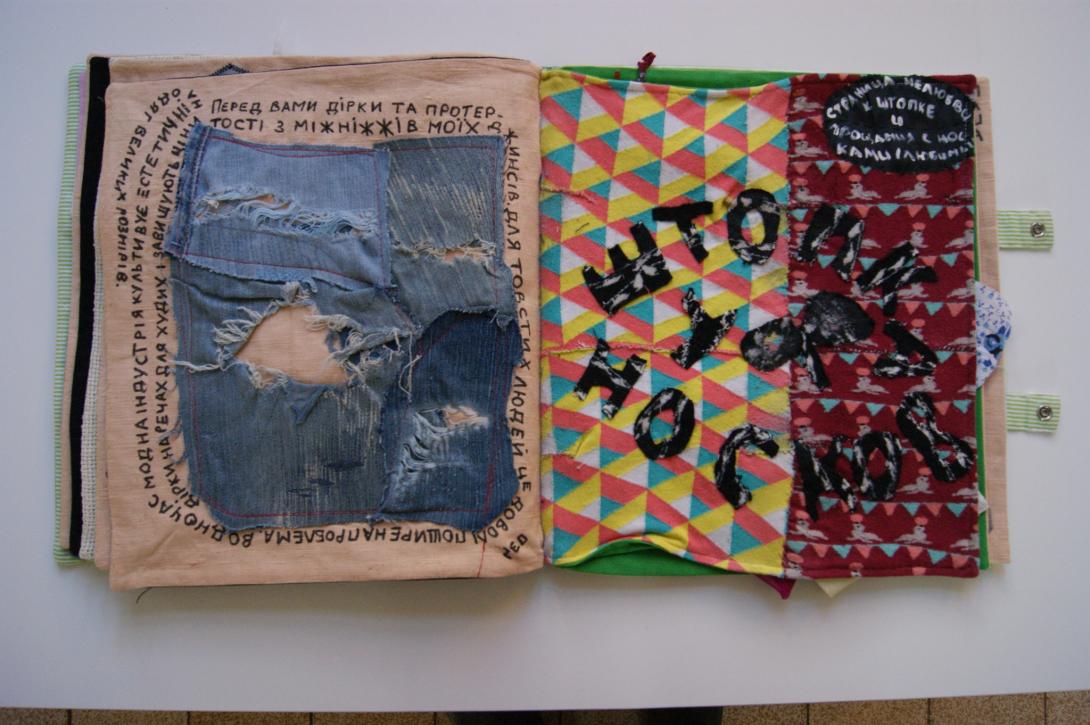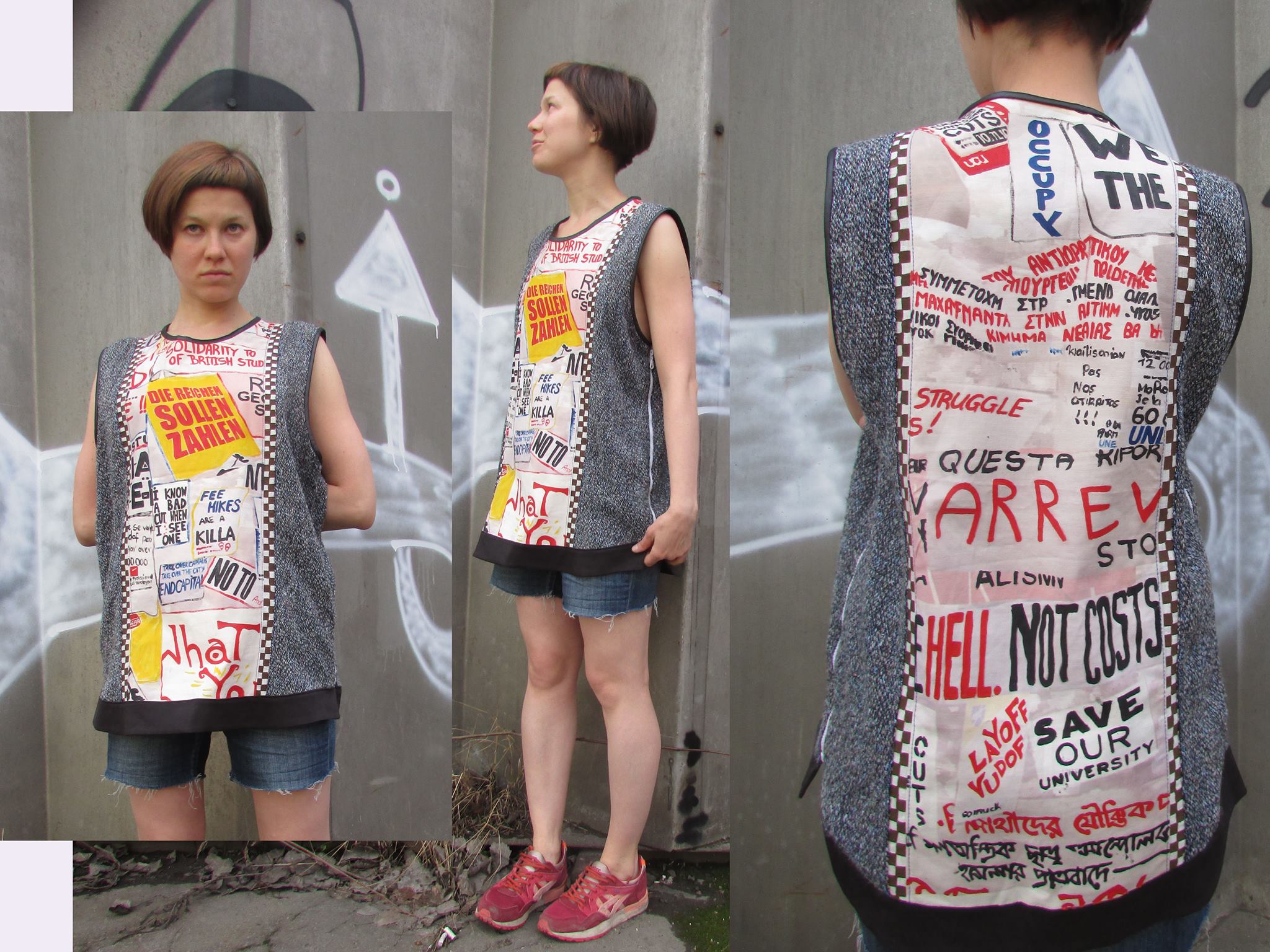
From the first days of the large-scale war, the capacity for self-organization of Ukrainian society was crucial. Where the State could not fulfill its tasks, society organized itself to respond. A gigantic social, humanitarian and solidarity activity has developed. Even in the military domain with Territorial Defense which has in a certain way become the organization of the armed people. This tradition of self-organization does not come from nowhere. The Maidan Commune (November 2013-February 2014) had already shown the whole world the deep willingness of the Ukrainian people to take their affairs into their own hands. Further, the powerful Ukrainian cooperative movement at the beginning of the 20th century certainly nourished this ability. It was a path and an instrument as much for national (anticolonial) as for social and economic emancipation. One of the programs of the 2023 feminist film festival (Kyiv) will be dedicated to labor rights. According to the organizers “Although we are actively sold the idea of professional success and that the office is like a second home, work is often not a question of pleasure but a question of survival. For us, labor rights are above all a question of solidarity and empathy. This is why we invited to co-organize this program a ReSew sewing cooperative – Швейний Кооператив (Chveïniï kooperativ), which exists politically and ecologically without bosses or subordinates and is united by the love of their work — sewing.”
We continue our exploration of the world of cooperatives and new forms of self-organization of Ukrainian society with an exchange with the members of this cooperative.
~Patrick Le Tréhondat
Please tell us the story of your cooperative and its activities, before and after February 24. How do you work or decide? What are the prospects for the future?
We organized into a cooperative in August 2016. We saw this project as economic, environmental, and feminist and planned to work in the following areas:
1) popularizing of the repairing and upcycling of clothes and textiles and an eco-friendly lifestyle.
2) publishing information about discrimination in the production of clothing and textiles (economic, environmental, gender), the forming of a fair value of labor in the clothing industry, criticism of fast fashion and overproduction of clothing and textiles.
3) joint responsibility of the project participants for the functioning of the cooperative: collective meetings, decision-making by consensus, joint management of social networks using alternative (not aggressive) marketing, communication with customers, procurement/search for materials, formation of a transparent financial scheme controlled by all cooperative members, and other functions.
Later, we started holding workshops where we taught, advised, and helped to repair clothes, modify them to suit the needs of the wearer, sew poches and canvas bags to replace plastic ones, and reusable menstrual pads. We started working a lot with the queer and trans communities, creating comfortable and affordable clothing for members of these communities. This was all important and interesting for us. We had regular customers and workshop attendees, who supported our principles.

Gradually, we earned enough money to buy industrial sewing machines and a steam generator, and we created comfortable conditions in the workshop. In different years, there were 5, 3, 2, 4, 3 participants. In 2018, together with the ZBOKU art initiative, we rented a joint space and started operating as a community center for queer, trans, and non-binary people in Kyiv. We wanted to inspire seamstresses to work with us or create similar cooperatives. In general, to popularize the cooperative form as an alternative to the hierarchical one, so we participated in demonstrations against the New Labor Code and artistic, cultural and educational events dedicated to the struggle for labor rights and working conditions in Ukraine.
Of course, we faced a lot of problems: the low cost of products in the textile market, the devaluation and lack of prestige of sewing labor, and even online bullying. But thanks to our own enthusiasm and the fact that we were surrounded by people who shared our principles, the cooperative continued to innovate. Starting on February 24, 2022, we stayed in Kyiv for about a month. We moved to the workshop because it was a semi-basement, sewed chevrons and underwear for the military and Territorial Defense on a volunteer basis. We helped everyone we could among our relatives, friends and in the neighborhood where we lived.
On March 20, 2022, 2 members of the cooperative left to Finland. Abroad, we started organizing events (solidarity dinners, film screenings, and presentations) to raise funds for comrades and initiatives that we know continue to work in Ukraine, including providing humanitarian aid to civilians on the front line and military aid to people from anti-hierarchical, feminist, and queer communities. It is also important for us now to maintain relationships with our friends and comrades with whom we have done activities in the past years and who formed our community, but are now scattered around the world.
The Kyiv feminist festival presents you as “politically and ecologically without bosses or employees”. What meaning do you give to this presentation?
One of the ideas and principles of the cooperative was the horizontal structure of the organization. Tonya (Ton) Melnyk, one of the founders of the cooperative, says that they had experience working in the garment industry in Ukraine in various positions, both as a subordinate and as a production manager. From all sides, it was a disappointing experience, because either they save on your wages and working conditions, or you are forced to do so because those higher up in the hierarchy set such requirements for the sake of profit. All of this leads to the exploitation of oneself, other people, and natural resources, which did not suit Ton, as a person with an activist background. Back then, 10 years ago, this idea of a horizontal sewing enterprise was born, where there would be no bosses or subordinates, all decisions would be made on the principle of consensus, that is, taking into account the interests and voice of each member of the cooperative, the profit would be divided equally, or according to alternative principles, depending on how the participants agree. Initially, the people interested in creating ReSew were people from environmental circles, and together with them ReSew was conceived as an upcycling project. But most of all, the idea resonated with leftist, anarchist, feminist, and queer circles. The critical attitude of all the members of the cooperative towards fast fashion, overproduction and pollution created by the global garment industry, along with the exploitation of mainly feminine socialized people, gave rise to the fundamental idea of being politically and environmentally opposed to any exploitation.
Do you know of other cooperatives like yours in Kyiv or Ukraine and if so have relationships with them?
When we were working in Kyiv, we cooperated with many grassroots horizontal initiatives and organizations, such as ZBOKU, Salt, Femsolutions, FreeFilmers, and others. But if we are talking about production cooperatives, there was Bar Koshchei and the Hleb Nasushchnyi cooperative. The latter cooked vegan dishes from dumsterdived products and offered them to the community at a very affordable prices or for free. We invited them to participate in, several of our events, including the Freemarket 2018. It was an interesting and positive cooperation. We also know about some cooperatives that existed and some still operate in Ukraine, although there was no specific cooperation between us. For example, in Nyzhnye Selyshche in Zakarpattia, there is the Longo Mai cooperative, which produces direct-pressed juices; in Lviv, there is a cooperative that sells sportswear and shoes; in Kharkiv, there has been a food cooperative based on anarchistic squat for quite some time. We also know several cooperatives from Belarus and Russia that share similar principles to ours, and we have cooperated several times in some joint anarchist events. For example, the printing cooperative Listovka and the Café-falafel shop Horizontal.
At the beginning of the 20th century, Ukraine experienced a significant cooperative movement which was a lever for the national and social liberation of Ukraine. What role do you give to cooperatives like yours in a social transformation of Ukraine with a view to social emancipation?
Cooperatives, in our opinion, are one of the ways to spread the principles and ideas of self-organization in society. Many grassroots movements owe a debt to these ideas. And grassroots movements, in turn, lead to major social changes and transformations. Our cooperative is young enough to be able to measure the impact of ReSew’s activities on society. At the same time, over the years of work, the attitude towards such ideas as recycling, upcycling and environmentally conscious behavior has changed significantly. Reusable pads, menstrual panties, pouches, and canvas bags are already in trend, and they are not associated with the Soviet past. But, if we talk about the cooperative movement in general, it is a school for people to be able to organize and act in different situations without leadership, which was repeatedly reflected in Ukrainian society at the beginning of the Maidan protests and also at the beginning and during the full-scale invasion. The ability to self-organize is a tool that allows society to show itself as a political actor that the so-called current government has to listen to. And the direction in which society will move depends on how this tool will be used. That is why it is very important to strengthen the voice of grassroots, feminist and anti-hierarchical communities in Ukraine to prevent the dominance of right-wing discourse, which easily takes over all the best instruments of social organization against the backdrop of war.
We often associate cooperatives like yours with the term self-management [самокерованість]. Does this term self-management seem to you to reflect what your cooperative is? Is this a familiar idea among the Ukrainian left or more generally in social activities?
We distinguish between the terms "self-management" and "self-organization". For us, it is the self-organization of people, individuals who invest a lot of resources in the activities of a grassroots horizontal organization that is more applicable. After all, all the members of the cooperative are not only seamstresses, they also communicate with clients, purchase materials, advertise activities of the organization, write educational and activist posts, they are accountants, PR activities of the organization cleaners, community managers and activists. All those involved in the cooperative's operation are equally responsible for its functioning. Self-management, in our opinion, somewhat erases the contribution of each individual working in the cooperative. We also do not see that anyone can join our cooperative at any time. This person should be one who shares the principles of intersectional feminism, ecological ideas of production, and is ready to work responsibly in a non-hierarchical structure. According to our observations, similar principles guide most leftist organizations in Ukraine and abroad, which position themselves as horizontal or non-hierarchical (low-hierarchical) and practice direct democracy tools.
November 9, 2023
Facebook page of ReSew coop
https://www.facebook.com/ReSewKyiv
Instagram of ReSew coop :
@resew_cooperative
To support
Patreon : Choose a subscription 2, 4, 6.. euros per month
Citations
Patrick Le Tréhondat (2024). An Interview with Ukraine's ReSew Coop. Grassroots Economic Organizing (GEO). https://geo.coop/articles/interview-ukraines-resew-coop

Add new comment